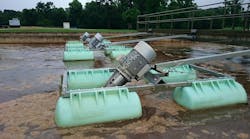Don’t put any oil in your car, the engine will run fine without it. Seems like bad advice, right? If someone gave you that advice, what would you do to that person or company when your engine broke? Scream? Lawsuits? Something worse?
Yet, we keep running into customers who tell us the water quality technician told them to “chuck the anode.” One customer told us his technician said that “the rod is only there for the shipping process to resolve any cracking in the glass liner that may have occurred during the long journey on a boxcar or truck. Others have been told similar things.
This is a case where ignorance is not bliss. The truth is that sacrificial anodes are an integral piece of the rust protection of glass-lined water heaters and every manufacturer has, in its instructions, some wording that removing the anode voids the warranty.
What does it do?
Glass-lined water heaters have been made the same way for over 50 years. Manufacturers weld a steel tank together and then bond a vitreous ceramic lining to the inside that protects most of the steel from rusting. However, there are always small amounts of exposed steel, and occasionally thin spots in the glass, so they also put one or more sacrificial anodes into the tanks.
Those anodes are made of magnesium or aluminum, which are metals that are more reactive than steel in the galvanic series of metal reactivity. If you were to view that list, you would see gold and platinum at one end, and magnesium and aluminum at the other. So, a gold water heater would seemingly last forever.
When the water heater is filled with water, an electrochemical reaction begins whereby a very small amount of electricity flows from the anode to the cathode, which in this case is tank steel. During the process, the anode is consumed, but very slowly. If there were no glass lining, it would be gone in a flash. When the anode is consumed, the water heater rusts out.
So, when technicians tell people to remove their anodes “because they are not really needed,” they are dooming the heater to an early death by rusting, and hurting their customers’ chances of getting a warranty replacement. At one time, water heaters were pretty cheap, but no more. The federal government got involved in the industry around 2000, first with energy-efficiency mandates, then with flammable vapor ignition-resistant (FVIR) systems that drastically raised the price of plain vanilla water heaters.
Now heaters are going high-tech, with heat pumps, electronics and condensing systems, and the prices are going higher. Would you tell Ferrari owners their engines don’t need oil? Then, technicians should stop telling customers to chuck their anodes.
The importance of anodes
But, why would people want to remove and discard their anodes? Everybody already knows the answer to that one: Rotten-egg odor. In many places around the country, and particularly in well water, there are bacteria that are otherwise harmless, but that produce hydrogen sulfide gas in conjunction with sulfur in the water and sacrificial anodes, which usually drives people crazy.
Often, changing the factory installed anode to one made of aluminum/zinc will reduce or eliminate the odor. But, in our experience, salt-based softeners make odor worse to the point that aluminum/zinc does not work.
In the past, faced with angry customers and the possibility of losing a sale, the standard response has been, “Chuck the anode.”
What technicians should do is help their customers solve the odor problem. Tankless water heaters don’t have anodes, so no odor. Certain electric heaters have a plastic tank and no anode, so no odor. And, something new has appeared in the past few years that many are not aware of: Impressed-current anodes for water heaters, and they do not produce odor either. This “powered anode” replaces the reaction of the sacrificial anode by feeding a very small amount of electricity into the tank. They plug into a wall socket and they do not get used up, so they do not need to be replaced.
There are only a couple of situations where these anodes do not solve odor problems. One is stagnation. If a water heater sits idle long enough, it will smell no matter what anode it has. A temporary remedy that always works is two pints of drugstore peroxide poured in the heater. The anode should be left in the tank, though, or the tank will start to rust.
The other situation? When the water heater is not to blame. Occasionally, bacteria build up in drains that mimic the rotten-egg odor of water heaters. The odor is often only noticeable when hot water is being used, so the water heater gets the blame. Clearly, there are now better solutions to this problem than the time-worn advice everybody has been giving, and it is high time technicians stopped saying, “Chuck the anode.”
Randy Schuyler runs waterheaterrescue.com and smellywater.com.


